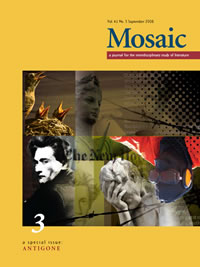Issue 41.3
Overview

Special Issue: Antigone
Published: September 2008
View the issue introduction or see the issue summary and contents below.
14 essays, totalling 224 pages
$24.95 CAD
A special issue that features a review of the current field of Antigone studies along with twelve studies that engage the figure and the play through the work of such critics as Hegel, Lacan, Butler, Agamben, Benjamin, Derrida, Nussbaum, Kristeva, Kierkegaard, de Beauvoir; and such topics as sovereignty, mourning, family, ethics, community, modernity, democracy, gender, and law. The issue includes a partial translation of Leopoldo Marechal’s AntígonaVélez.
Antigone NowKERI WALSH “Antigone Now” assesses the influence of recent scholarship in classics, psychoanalysis, and literary theory on the reception of Sophocles’s Antigone, and suggests that the fields of dramatic criticism, theatre history, and performance studies offer promising resources for future work on Antigone. | |
Dangerous Fracture: Undermining the Order of the Law in Sophocles’s AntigoneKATRIN BEUSHAUSEN This essay offers a political reading of Antigone as a fundamental questioning of the law. Drawing on Benjamin, Derrida, and Agamben, it traces within the play a scandalous duplicity of violence at the heart of the law that always already undermines its authority. Today, this fracture of the law once again haunts democracy in a concealed sovereignty reborn. | |
Hegel’s Antigone and the Tragedy of Cultural DifferenceKARIN DE BOER This essay deploys Hegel’s account of Antigone in Phenomenology of Spirit to reflect on conflicts that challenge the contemporary world. It argues that contemporary discourses often fail to recognize the tragic nature of the conflicts between such values as are defended by the state and by cultural minorities. | |
From Ethical Substance to Reflection: Hegel’s AntigoneVICTORIA I. BURKE Hegel’s treatment of Sophocles’s Antigone exposes a tension in our own landscape between religious and civil autonomy. Like Antigone, women often find that they can identify with the unreflective ethical substance in which they are at home only if they are at odds with the public law, as represented by Creon. | |
Suffering Tragedy: Hegel, Kierkegaard and Butler on the Tragedy of AntigoneSHONI RANCHER Hegel argues that modernity lacks the substantive ties that are central to the opposition in Antigone. Kierkegaard’s and Butler’s interpretations respond by answering why the problems that the ancient tragedy raises are still problems for modernity. | |
Citing the Law in Sophocles’ AntigoneJUDITH FLETCHER Antigone’s defiance of Creon’s interdiction against burying Polyneices activates a form of public discourse in Thebes that corresponds to some of the informal discursive processes of Athenian democracy. The structure of the text, which allows Antigone to articulate the edict before Creon repeats it to the Elders, emphasizes her powerful intervention in public talk. | |
Antigone FragmentWALTER CORBELLA In his play, Antígona Vélez, Argentine author Leopoldo Marechal adapted the Greek myth to the social reality of the nineteenth-century Argentine pampas, when new settlers clashed against the original inhabitants of the land. Thus, Marechal examined the forces that helped to shape his nation, exploring the limits of honour and tradition, and producing a moving portrayal of the conflicts that arise when love and obligation are at odds. | |
The Devastated Nest: Crises of Identity in Wuthering Heights and AntigoneSTEVE LUKITS The shared metaphor of a devastated nest in Antigone and Wuthering Heights signals feminist dissent against constraining social order. This essay presents an extended reading of this significant trope. Rhetorical, intertextual, and cultural analyses reveal that patriarchal forces in the tragedy and in the novel domesticate and suppress the women’s rebellions. | |
The Apolitics of Antigone’s Lament: (From Sophocles to Ariel Dorfman)R. CLIFTON SPARGO Apolitics describes motives or actions arising as though from outside the dominant paradigm of politics, in a manner typified by Antigone’s famous gesture. Proceeding from Sophocles’s ancient figure, through Kierkegaard’s modern revision, to Ariel Dorfman’s newly allegorized Latin American heroines, this essay interprets Antigone’s conflict with rogue sovereignty as signifying a crisis in all so-called political categories. | |
The Mind Taken Hostage: Antigone’s Corporeal Memory in Mind the GapCHRISTEL STALPAERT Mind the Gap, a drama written by Flemish author Stefan Hertmans in 2000, features the figure of Antigone, whose cruel past and bodily suffering intrude on her capacity to remember. Antigone’s body-poetics shares similarities with Artaud’s prise de conscience of his lived selfhood as a suffering body. | |
Antiogone, désoeuvrée: Tragedy, Finitude, and CommunityDAMIAN STOCKING An attempt to resolve the question of whether Greek tragedy does the work of communal affirmation or political critique, this essay employs the definition of community offered by Jean-Luc Nancy in La Communauté Désoeuvrée to argue that it is precisely by means of critique that tragedy constitutes an Athenian “community” as such. | |
Simone de Beauvoir and Antigone: Feminism and the Conflict between Ethics and PoliticsAMY E. STORY This essay examines Simone de Beauvoir’s reading of Antigone in “Moral Idealism and Political Realism.” I argue that Beauvoir’s reading of the play is inadequate because it does not take into account the constraints Antigone faces as a woman in her time and place. I offer a reading that accounts for gender in ways that Beauvoir might have done later in her career. | |
Castrating Antigone: The Cliché of Terror in Marco Bellocchio’s Devil in the FleshGRAEME STOUT This essay argues that Antigone serves as both a subtext and a material example of misreading within Marco Bellocchio’s Devil in the Flesh. The emergence of Sophocles’s text in the final scene of the film is read through Pasolini’s concept of the cinema of poetry and Deleuze’s notion of the cliché. | |
Between Individual Principles and Communal Obligation: Ethical Duty in Sophocles’s AntigoneKATHRYN WALKER Building on Lacan’s interpretation of Antigone, this essay focuses on the ethical significance of the relationship between individual and community. It suggests that as the characters negotiate between individual principles and communal obligation, the play presents a worldview defined by both a deep sense of communal obligation and an imperative to transcend communal norms. |